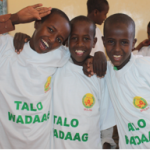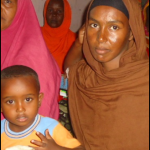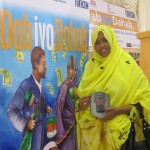
He held a piece of paper to his chest and tried to explain what he had drawn: a painted wall where he used to sit and sniff glue, and a restaurant where he begged for food. “They used to kick us away and pour hot water on us,” said 12-year-old Abdi Omar Yusuf.
When Qani Abdi Alin and her two friends bought their first sewing machine in 2009, none of them knew how to sew. They paid $160 for an instruction book and peered at the diagrams since the instructions were not in Somali or English. The tailoring business in Somaliland is dominated by men, but Alin and her colleagues saw an opportunity. “We identified a market for certain women’s clothing,” says Alin. “We thought ‘Why do we have to look for a job? Why can’t we generate our own employment?’”
In the early morning hours of Dec. 13, 2012, Somali youth sprinted across Hargeisa, taking part in the Hargeisa Youth Amazing Race. The contest raised awareness about youth-related services and youth-managed businesses across Hargeisa.

Fatumo Jama Ahmed is a 30-year-old mother of two who lives in Berbera, Somaliland.
Ahmed did not go to school when she was young because, like many Somali girls, she was kept at home. Now, however, she is attending a USAID-supported basic education class, her son by her side.

As many Somali youth are learning, being good at arithmetic is not the same as knowing how to manage a household or run a business. That is one of the messages of a new Somalia soap opera, dubbed Fire and Gold, launched in February, 2011.








Comment
Make a general inquiry or suggest an improvement.